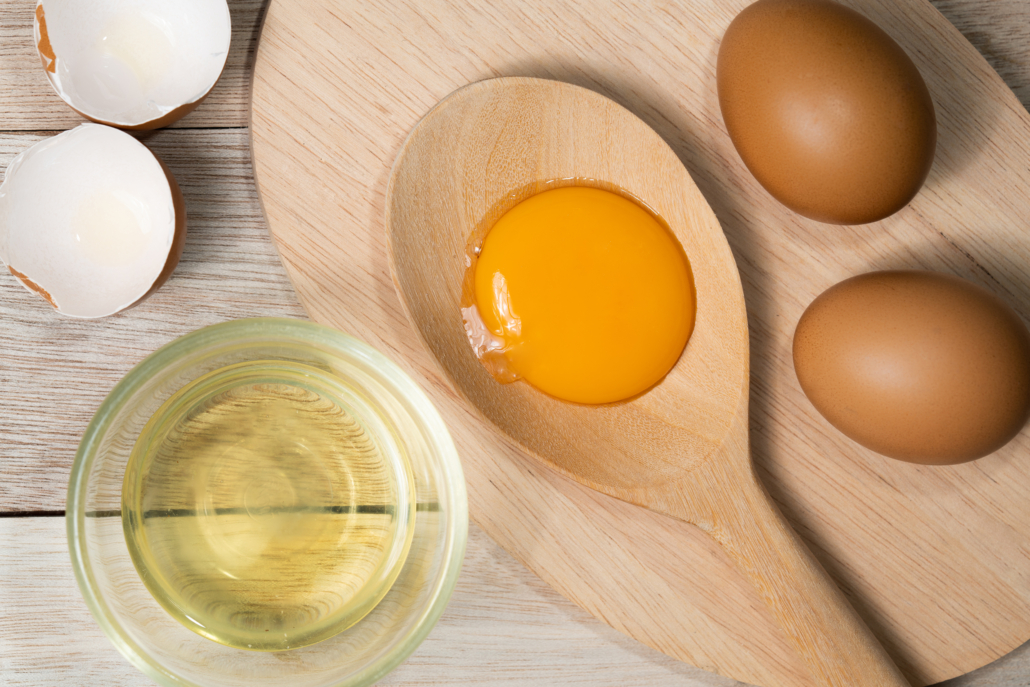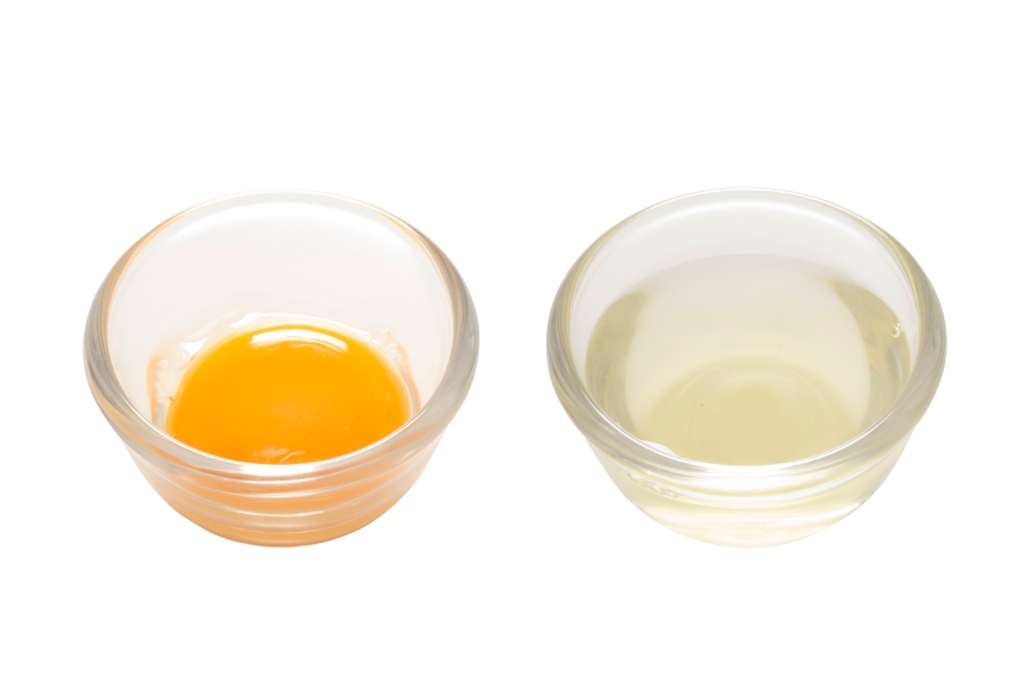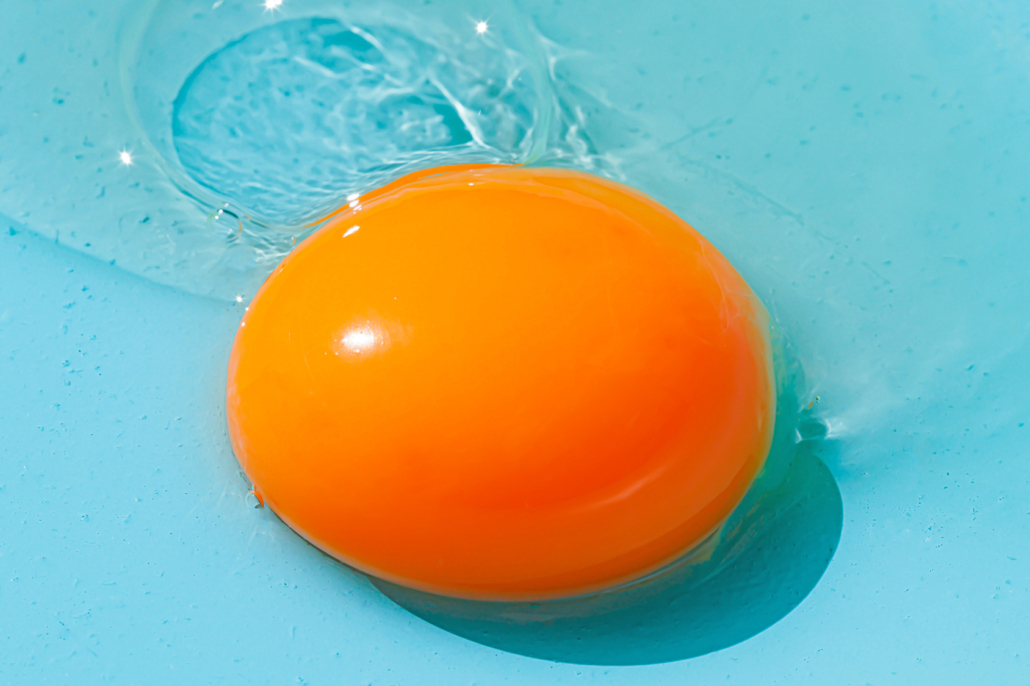We include products in articles we think are useful for our readers. If you buy products or services through links on our website, we may earn a small commission.
Are Scrambled Eggs Good for You? What the Science Says
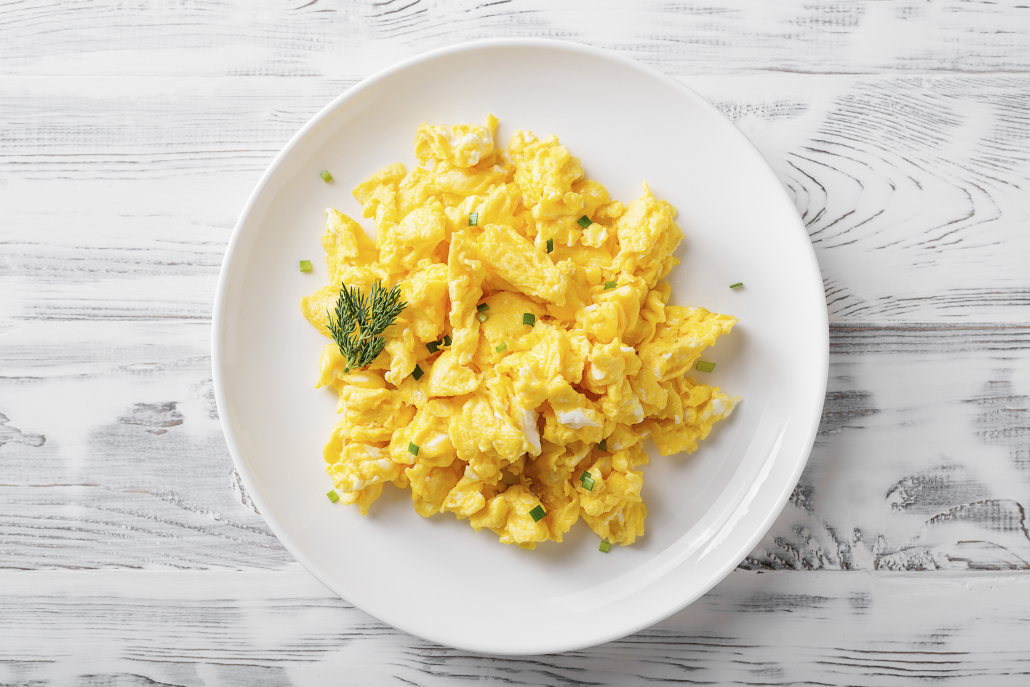
Table of Contents
Scrambled eggs are high in cholesterol and fat, yet they’re one of the most nutrient-rich foods on the planet. Scrambling eggs is also the most popular way to prepare them, accounting for 36% of all eggs consumed in America. This all begs the question, are scrambled eggs good for you?
This is really a two-part question.
- Are eggs healthy in general?
- Does scrambling eggs make them more or less healthy?
Let’s take a look at what the science says…
Are Eggs Healthy?
This may come as a surprise to some, but the short answer is, yes!
Eggs are very healthy. After being demonized for nearly 60 years, eggs are finally being let out of the cage–nutritionally speaking.
A 2017 meta-analysis looking at numerous studies confirmed that even people with heart disease risk factors can safely consume at least seven eggs per week as part of a healthy diet.
These findings are reflected in a 2013 meta-analysis in the British Medical Journal, showing that not only is eating an egg a not associated with increased risk of coronary, it also will not increase risk of stroke. 2
And again, in a large-scale Harvard study looking at more than 80,000 female nurses, we see the same thing–eating eggs is not associated with an increased risk of heart disease.
On the contrary, recent research shows that eating eggs may actually reduce the risk of heart disease.
One massive study examining 500,000 Chinese people found that those who ate eggs daily had a 14% lower risk of major cardiac events, an 11% lower risk of CVD, a 12% lower risk of ischemic heart disease, and an 18% lower risk of CVD death.
What About Cholesterol in Eggs?
Much of the demonization of eggs is based on the fact that they’re the most cholesterol-rich food on earth.
A single egg yolk contains appx 237 mg of cholesterol. Yet, better science has revealed that eating high cholesterol foods does not necessarily increase blood cholesterol levels. The idea that dietary cholesterol is bad, is but a myth.
Rather, it’s the carbs we eat that are the main contributor to dangerous blood lipid levels.
Studies show that getting more than 60% of your calories from carbs lowers your HDL (good) cholesterol while raising triglycerides–not good for heart health.7
So, how do eggs affect cholesterol?
Numerous studies have shown that eggs increase HDL (good) cholesterol.
And most people (70%) see no increase in either total or LDL cholesterol. A small percentage of people may see a small increase in a benign type of LDL that does not have an effect on heart health.
Scrambled Eggs Nutrition
Now that we know that scrambled eggs aren’t the dietary kryptonite that they’ve made out to be, let’s look at the nutrition benefits that you’ve been missing out on.
9 Scrambled Eggs Nutrition Benefits
- Eggs are the most inexpensive source of high-quality protein. 6.7 grams per 1 egg, at $.17 cents each (conventional)
- They offer all 9 essential amino acids, making eggs a complete protein
- One scrambled egg offers 147 mg of choline–25% RDA. The choline that pregnant women get from scrambled eggs can reduce the risk of birth defects. While choline deficiency in both men and women can result in muscle damage and abnormal deposition of fat in the liver.
- Rich in vitamins A, necessary for healthy eyes.
- Contains vitamins A, E, B2, B6, and B12 that dilate blood vessels and reduce the accumulation of cholesterol in the arteries.
- 42% of Americans are vitamin D deficient. A single egg offers 6% of vitamin D, necessary for bone health and a strong immune system
- Egg yolk contains antioxidants lutein and zeaxanthin which can protect against cataracts and macular degeneration.
- Scrambled eggs are extremely satiating, making you less likely to eat other less healthy foods
- The “good” HDL cholesterol in scrambled eggs has antioxidant properties. It can even remove LDL cholesterol from your bloodstream.
Nutrition facts per 1 scrambled egg:
Macronutrients
| Calories | 70 | 4% |
| Fat | 5 | 8% (N/A for Keto/ Low-Carb) |
| Saturated Fat | 1 | 5% (N/A for Keto/ Low-Carb) |
| Protein | 6 | 12% |
Vitamins
| Vitamin A | 400 IU | 8% |
| Vitamin D | 1 mcg | 6% |
| Vitamin E | 1.2 mg | 6% |
| Riboflavin | .229 mg | 18% |
| Folate | 24 mcg | 6% |
| Vitamin B6 | .1mg | 4% |
| Vitamin B12 | .45 mcg | 19% |
| Pantothenic Acid | .7 mg |
Minerals
| Nutrient | Amount | DV |
| Calcium, Ca | 28.00 mg | 2 % |
| Copper, Cu | 0.036 mg | 4 % |
| Fluoride, F | 0.6 mcg | |
| Iron, Fe | 0.88 mg | 5 % |
| Magnesium, Mg | 6.00 mg | 2 % |
| Manganese, Mn | 0.014 mg | 1 % |
| Phosphorus, P | 99.00 mg | 14 % |
| Potassium, K | 69.00 mg | 1 % |
| Selenium, Se | 15.3 mcg | 28 % |
| Sodium, Na | 71.00 mg | 3 % |
| Zinc, Zn | 0.65 mg | 6 % |
Proteins and Amino Acids
| Nutrient | Amount | DV |
| Protein | 6.28 g | 13 % |
| Alanine | 0.367 g | |
| Arginine | 0.410 g | |
| Aspartic acid | 0.664 g | |
| Cystine | 0.136 g | |
| Glutamic acid | 0.837 g | |
| Glycine | 0.216 g | |
| Histidine | 0.154 g | 22 % |
| Isoleucine | 0.336 g | 24 % |
| Leucine | 0.543 g | 20 % |
| Lysine | 0.456 g | 22 % |
| Methionine | 0.190 g | |
| Phenylalanine | 0.340 g | |
| Proline | 0.256 g | |
| Serine | 0.485 g | |
| Threonine | 0.278 g | 26 % |
| Tryptophan | 0.083 g | 30 % |
| Tyrosine | 0.249 g | |
| Valine | 0.429 g | 24 % |
| Phenylalanine + Tyrosine | 0.589 g | 34 % |
| Methionine + Cysteine | 0.190 g | 18 % |
Looking at scrambled egg nutrition by itself is compelling, and it’s even more impressive when you compare scrambled eggs with the nutrients in vegetables:
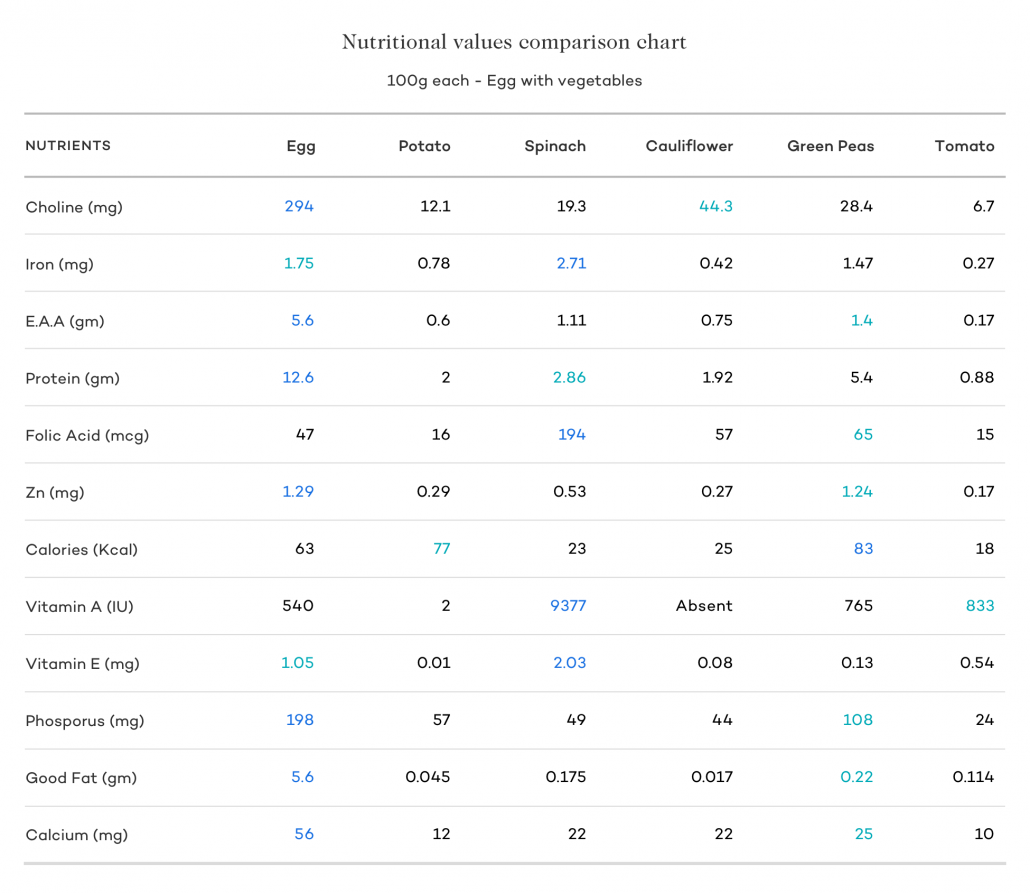
Scrambled Eggs May Help You Lose Weight
Because scrambled eggs are extremely satiating, researchers have explored their role in weight loss.
In one 2005 study obese subjects were randomly served one of two breakfasts each morning over two weeks. One breakfast was eggs, and the other was bagel-based, and both had equal calories. At the end of two weeks researchers concluded that the egg-breakfast “induced greater satiety and significantly reduced short-term food intake.”
A 2013 study showed that an egg-based breakfast resulted in participants consuming 270-470 fewer calories at a buffet lunch and dinner that same day.
And there is no research suggesting that eating eggs can lead to weight gain.
Are There Drawbacks to Scrambled Eggs?
Though eggs are healthy, as with most foods, cooking eggs can reduce some nutrients. This is especially true if they’re cooked for long periods of time, or at high heat.
One study found that baking eggs for 40 minutes can reduce their vitamin D by up to 61%. But when fried or boiled for shorter times, they only lose up to 18%.
Another study looking at the effects of cooking eggs, showed that it reduced the vitamin A by 17-20%.
Studies have also shown that cooking eggs may also reduce their antioxidant levels by 6–18%.
But cooking eggs isn’t all bad. It makes the protein far more digestible and available for use in the body. .
One study comparing raw and cooked eggs found that the body can use 91% of the protein in cooked eggs, but only 51% in raw eggs.
The takeaway is that shorter cooking times are best. But even though cooking reduces some nutrients, eggs are still a great source of nutrition.
High-heat Cooking and Cholesterol Oxidation
As mentioned above, eggs are high in cholesterol. Though there are no longer upper limits on recommended daily allowance (RDA) of cholesterol, the cholesterol in eggs may pose a problem if it becomes oxidized from high heat cooking.
When the cholesterol in eggs is oxidized it can form compounds called oxysterols. Oxysterols in the blood are linked to increased heart disease risks.
It’s worth noting that the eggs pose a minor source of oxidized cholesterol. Most of the oxysterols in our diet come from fried foods, like fried chicken and french fries. Furthermore, the cholesterol that’s oxidized in the body–from eating processed foods and added sugars–is likely more dangerous than the oxidized cholesterol you eat.
The most important point to consider with regards to oxidized cholesterol in eggs is that for healthy people NO studies link consuming eggs with an increased risk of heart disease.
The Healthiest Way to Scramble Eggs?
Though scrambling eggs may oxidize some of the cholesterol in the yolk, there are ways to make your scrambled eggs healthier.
The first step is to start with the healthiest eggs.
Pastured Eggs vs. Conventional

Not all eggs are created equal. Pasture-raised eggs where the hens are allowed to roam around outdoors in the sunshine have higher vitamin D.
(For an in-depth guide to understanding egg labels and buying the best eggs, click here.)
In 2007, Mother Earth News surveyed 14 flocks of truly pasture-raised egg producers. Compared to the USDA caged eggs. The survey found pasture-raised eggs contained:
- 1/3 less cholesterol
- 2/3 more vitamin A
- 2 times more omega-3 fatty acids
- 3 times more vitamin E
- 7 times more beta carotene
| Values per 100 grams | Vitamin E | Vitamin A | Beta Carotene | Omega-3s | Cholesterol |
| Eggs from Caged Birds | .97mg | 487IU | 10mcg | .22g | 423mg |
| Pasture-Raised Eggs | 3.73mg | 792IU | 79.03mgc | .66g | 277mg |
Omega-3 enriched eggs have 39% less arachidonic acid than conventional eggs. This is an inflammatory omega-6 fatty acid that most people eating a Standard American Diet, have far too much of. They also have 500% more omega-3 than both conventional and organic eggs.
Don’t Overcook Scrambled Eggs
High heat for longer periods can both reduce the nutrients and oxidize the cholesterol in eggs.
The best way to scramble eggs is to cook them for a short amount of time over medium heat. The good thing about scrambled eggs is that they’re the fastest way to cook eggs, meaning they’re subjected to less heat than other methods.
Use a Heat-Stable Cooking Oil
Stay away from vegetable and seed oils high in PUFAs that can oxidize easily when heated.
For rich, satiating, and healthy scrambled eggs choose heat-stable whole animal fats like tallow, lard, ghee, and butter.
Are there Healthier Ways to Prepare Eggs?
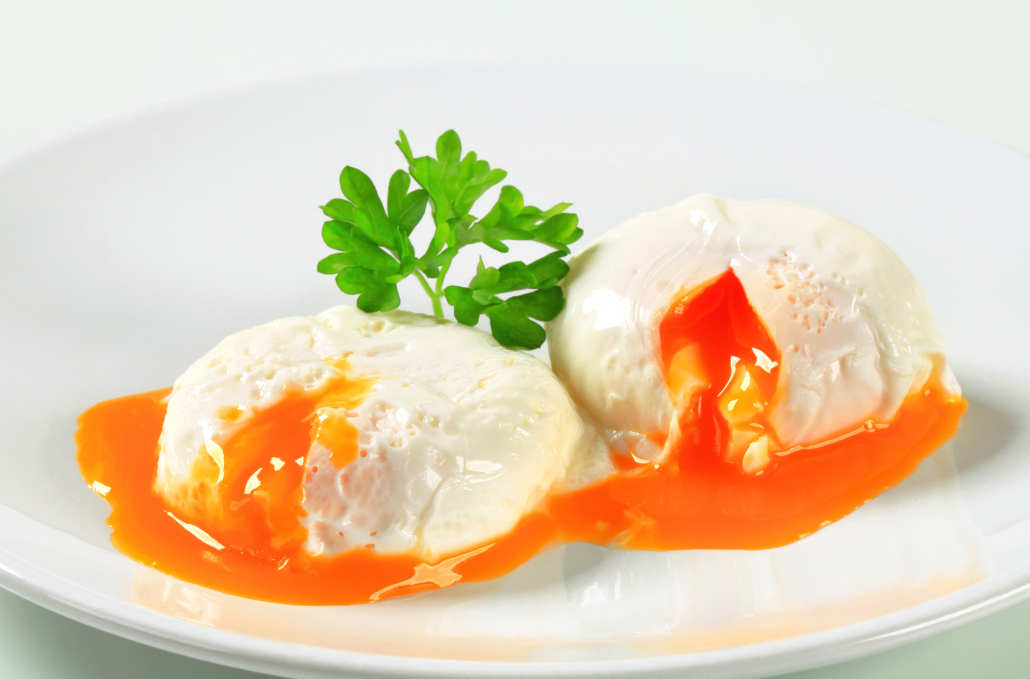
If you’re concerned about reducing oxidized cholesterol and getting the maximum nutrients, poaching eggs may be the healthiest way to prepare them.
Poaching eggs is relatively cool and quick while keeping the yolks intact.
To poach eggs simply simmer water between 160–180°F (71–82°C), crack your eggs in and cook for 2–3 minutes.
Are Scrambled Eggs Good for You? The Takeaway
Scrambled eggs are very good for you. In fact, eggs, whether scrambled or otherwise are one of the most nutrient-rich foods on the planet.
After decades of misinformation, we now know that for healthy people, eggs have no negative effects on heart health, and may actually improve cholesterol levels.
But remember, cooking your eggs for the shortest time with the lowest heat will retain the most nutrients while resulting in the least amount of cholesterol oxidation.
Choose pasture-raised eggs when available, and always use a heat-stable cooking oil like tallow and ghee loaded with healthy saturated fats.












